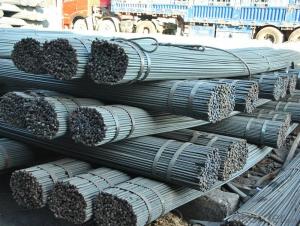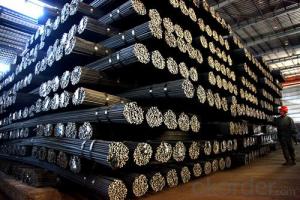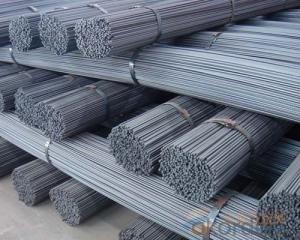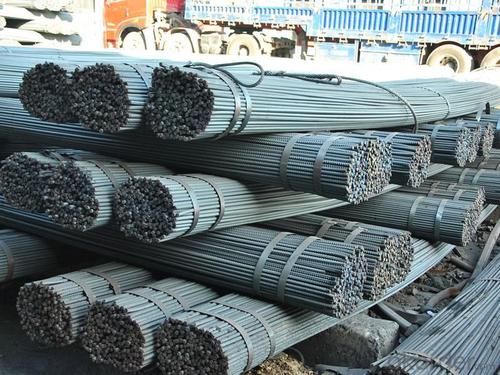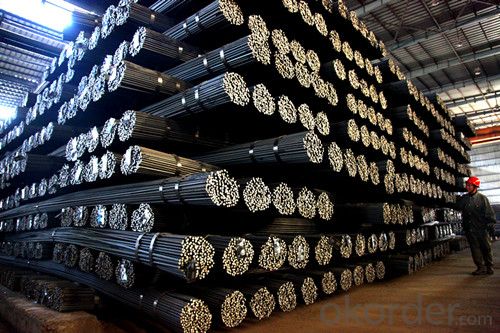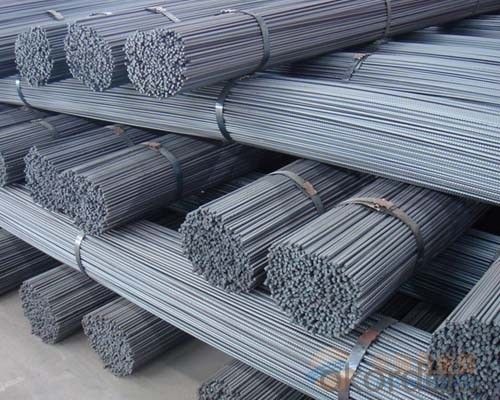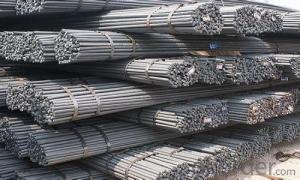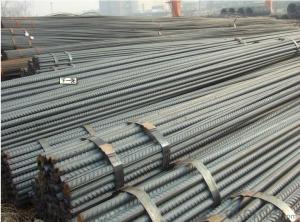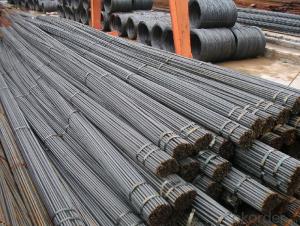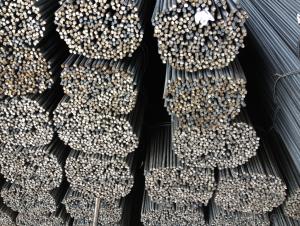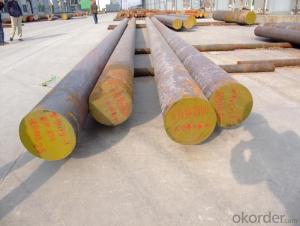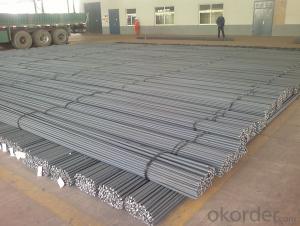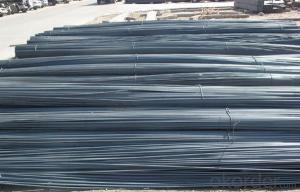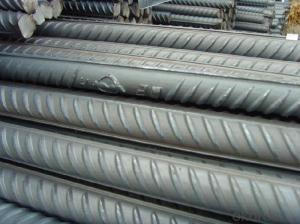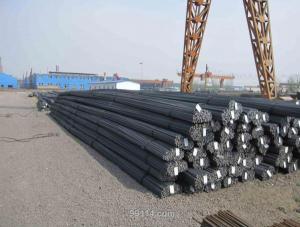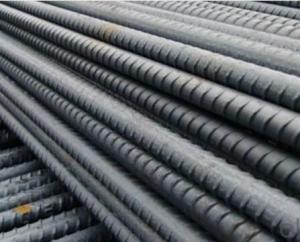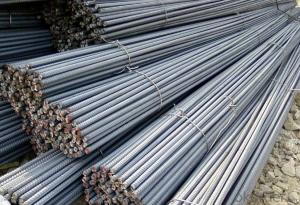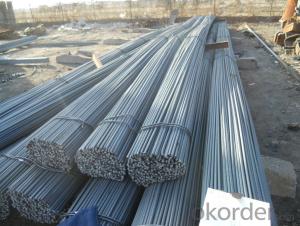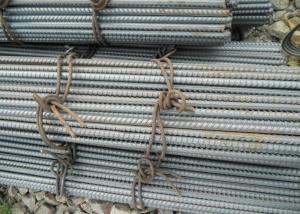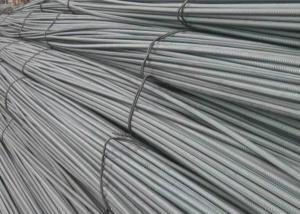Deformed Steel Bar Iron Rods For Construction/Concrete
- Loading Port:
- Shanghai
- Payment Terms:
- TT OR LC
- Min Order Qty:
- 100 m.t.
- Supply Capability:
- 1000 m.t./month
OKorder Service Pledge
OKorder Financial Service
You Might Also Like
deformed steel bar grade 40
material: HRB400, BS4449 GR460B
size: 8-36mmx12m.
short delivery time by bulk or container
deformed steel bar grade 40
material: HRB400, BS4449 GR460B
size: 8-36mmx12m.
short delivery time with bulk or container
packing: Mill standard export packing in bundles/coil, around 2tons/bundle.
country of Origin: China
delivery Time: Within a 35 days
Shipment: by bulk vessel or by container
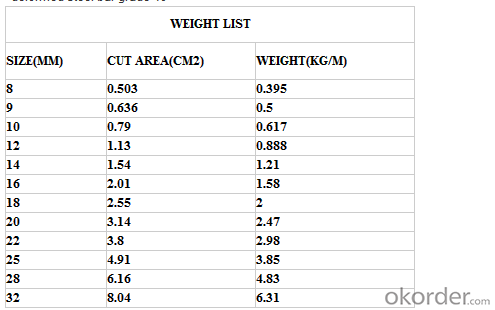
Leading goods:
section steel:angles,channels,I-beam,H-beam;
coils:cold/hot rolled coils,PPGI,galvanized coils,plate,checkered plate,cutting steel plate,steel strip;
wire rod:steel wire,deformed wire,bar;
pipe:seamless pipe,rectangular pipe,welded pipe,spiral welded pipe,pipe fittings;
stainless steel:steel sheets,stainless steel strips,stainless bar,stainless tube;
special:weathering steel,shipbuilding steel;
construction steel:C-channel,Z-channel,T-bar,high-speed divider plate,corrugated steel plate,steel grating.
Advantage:
We are the spot supplier, Six huge warehouses which can hold 20,000 MT goods.It makes the cost lower than others,we can provide the competitive price for you.
Delivery time:
Normal sizes can be provided in 7days, the others should be ready in 30---45 days.
Further treatment:
We can offer cutting,painting,drilling holes,bending,threading, welding,galvanization,packing etc.
Security interest:
We have already passed the ISO9001, BV and SGS authentication which makes the quality secured.
If you have the interest in any of the products we can provided,
pls don't hesitate to connect with me. Looking forward to cooperate with you.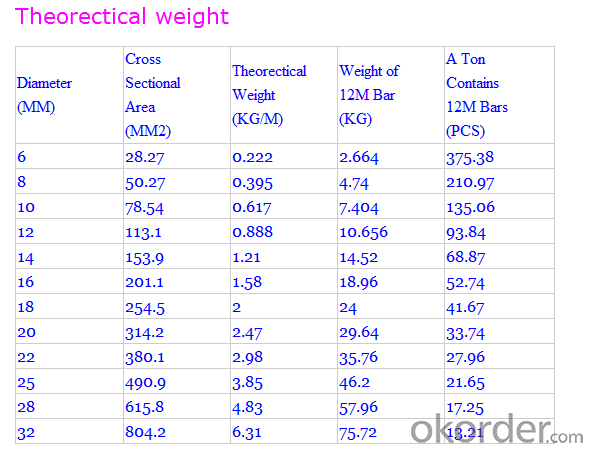
FAQ of Steel Deformed Bar
1. More than 10 years experience in this industry
2. 100,000 tons exporting per month
3. Professional foreign trade tea
4. OEM&ODM capacity
5. High quality assured & competitive price
6. Try our best to meet your needs & save your budget
7. Very popular in Southeast Asia, Africa, Mid-East and South America etc.
8. VIP membership system, first time customers and long-term cooperation customers can get extra discount on some products.
- Q: How do steel rebars affect the overall constructability of a project?
- Steel rebars have a significant impact on the overall constructability of a project. These reinforcing bars, commonly known as rebars, play a crucial role in enhancing the strength, durability, and stability of concrete structures. They are instrumental in mitigating the tensile forces that concrete alone cannot withstand, thereby increasing the overall load-bearing capacity of the structure. Firstly, steel rebars simplify the construction process by providing a framework for pouring and shaping concrete. They act as a skeletal structure that holds the concrete in place during the curing process, ensuring that it sets properly and takes the desired shape. This contributes to the overall efficiency of construction projects, as it allows for faster concrete placement and reduces the risk of structural deformities. Moreover, rebars enhance the structural integrity of the project. By reinforcing the concrete, they improve its ability to resist cracking, bending, and breaking under various loads and environmental conditions. This increased strength and resilience make the structure more durable and reduce the need for frequent repairs or maintenance, ultimately saving time and costs in the long run. In addition to strength and durability, steel rebars also enhance the constructability of a project by enabling flexibility in design. With rebars, architects and engineers have the freedom to create complex and innovative structures, such as high-rise buildings, bridges, and tunnels, that require high load-bearing capacities. The versatility of rebars allows for the construction of structures with unique shapes, curves, and spans, expanding the possibilities of architectural design. Furthermore, steel rebars facilitate constructability by enabling the construction of large-scale projects. The use of rebars allows for the creation of reinforced concrete elements, such as columns, beams, and slabs, which can support heavy loads and distribute them evenly throughout the structure. This capability is particularly crucial for projects that require significant weight-bearing capacity, such as industrial buildings or infrastructure projects. Overall, steel rebars have a profound impact on the constructability of a project. They simplify the construction process, enhance structural integrity, enable flexibility in design, and facilitate the construction of large-scale projects. By incorporating rebars into concrete structures, construction professionals can ensure that their projects are stronger, more durable, and better equipped to withstand various loads and environmental conditions.
- Q: Can steel rebars be used in pre-stressed concrete construction?
- Yes, steel rebars can be used in pre-stressed concrete construction. In pre-stressed concrete, steel rebars are used as reinforcement to withstand tension forces. These rebars are strategically placed and pre-stressed with tension to counteract the potential stresses and improve the structural strength and durability of the concrete.
- Q: Difference between round bar and threaded steel in use
- Because the surface has a thread shape, it can increase the firm bond with the concrete. The longitudinal reinforcement and stirrups shall be used preferentially in the concrete members.
- Q: Can steel rebars be used in wind turbine tower construction?
- Yes, steel rebars can be used in wind turbine tower construction. Rebars provide strength and structural support to the tower, ensuring its stability and ability to withstand strong winds.
- Q: Can steel rebars be used in dams and reservoirs?
- Yes, steel rebars can be used in dams and reservoirs. Steel rebars are commonly used in the construction of dams and reservoirs to provide structural reinforcement and strength to the concrete structures. The rebars are embedded within the concrete to enhance its tensile strength and prevent cracks or failure.
- Q: How do steel rebars contribute to the overall ductility of a structure?
- The overall ductility of a structure is significantly improved by steel rebars in various ways. To begin with, steel rebars possess high flexibility and can endure substantial stress before yielding or breaking. This flexibility enables them to absorb and distribute the applied load, minimizing the risk of sudden failure or collapse. By reinforcing the concrete, rebars assist the structure in withstanding external forces like earthquakes or extreme weather conditions. Furthermore, rebars augment the tensile strength of the concrete. Although concrete is renowned for its impressive compressive strength, its tensile strength is relatively low. When stress is exerted on a structure, rebars aid in resisting tension forces and averting cracking or failure. This ensures that the structure can withstand both compressive and tensile forces, thereby bolstering its overall durability and safety. Moreover, steel rebars also bolster the structural integrity by impeding the propagation of cracks. When a crack initiates in a concrete element, the rebars act as a barrier, restraining the crack's expansion and preventing rapid dissemination. This characteristic of rebars helps to uphold the overall stability and integrity of the structure. Additionally, steel rebars offer a greater degree of flexibility during construction. They can be easily bent, shaped, and joined to meet specific design requirements, granting architects and engineers the ability to create structures that are more aesthetically pleasing and functional. This flexibility also facilitates the construction process by allowing modifications or adjustments to be made without compromising the overall strength or stability of the structure. In conclusion, steel rebars play an indispensable role in enhancing the ductility of a structure. They heighten the tensile strength, absorb and distribute stress, impede crack propagation, and provide flexibility during construction. These properties contribute to the overall durability, safety, and structural integrity of a building or infrastructure, establishing steel rebars as an essential component in contemporary construction practices.
- Q: How are steel rebars checked for proper alignment during construction?
- Steel rebars are checked for proper alignment during construction using various methods. One common approach is to visually inspect the rebars to ensure they are positioned correctly according to the construction plans and specifications. Additionally, laser alignment tools or string lines may be used to ensure the rebars are placed in a straight line and at the correct depth. Construction professionals may also use measuring devices, such as calipers or tape measures, to verify the rebars' spacing and alignment. Regular quality control checks and inspections are crucial to ensure the rebars are aligned correctly, as this is essential for the structural integrity of the construction project.
- Q: Can steel rebars be used in modular construction?
- Yes, steel rebars can be used in modular construction. Rebars are commonly used in reinforced concrete structures, and modular construction often involves the use of prefabricated concrete panels or modules that are assembled on-site. So, steel rebars can provide additional strength and reinforcement to these structures, making them suitable for modular construction projects.
- Q: How are steel rebars protected against extreme weather conditions?
- Steel rebars are protected against extreme weather conditions through various methods such as epoxy coating, galvanization, and concrete cover. These protective measures prevent corrosion and degradation of the rebars, ensuring their durability and strength even in harsh weather conditions.
- Q: Does the grade three thread steel with "E" have the same information price as the ordinary three grade thread steel? Is there a big difference?
- Hello, with E thread steel is seismic rebar, without E is the common thread steel, general seismic thread with E was higher than that of ordinary steel prices, the price difference between 50 and 100 yuan, according to the specific market situation.
Send your message to us
Deformed Steel Bar Iron Rods For Construction/Concrete
- Loading Port:
- Shanghai
- Payment Terms:
- TT OR LC
- Min Order Qty:
- 100 m.t.
- Supply Capability:
- 1000 m.t./month
OKorder Service Pledge
OKorder Financial Service
Similar products
Hot products
Hot Searches
Related keywords
